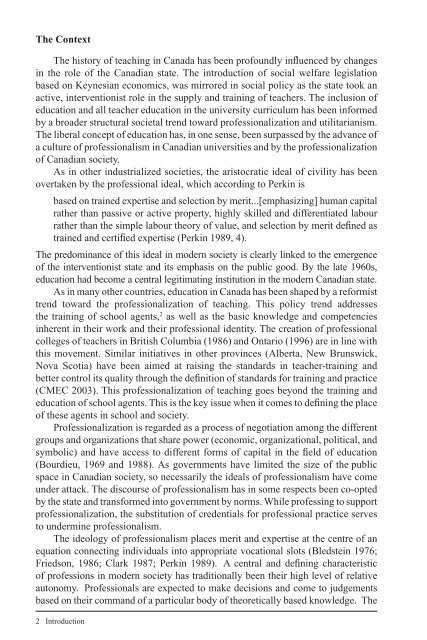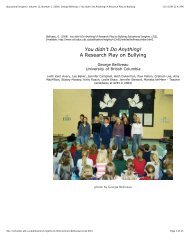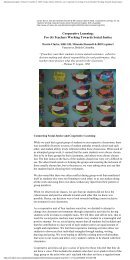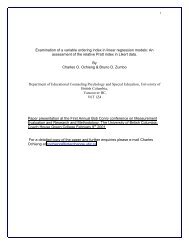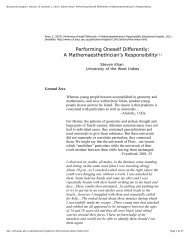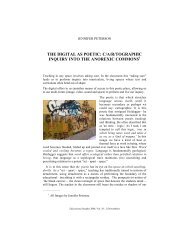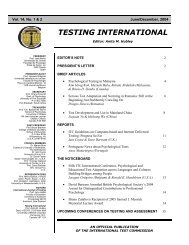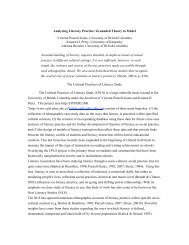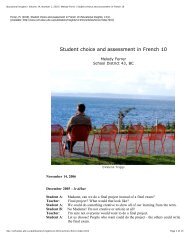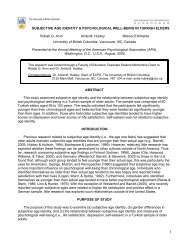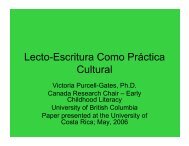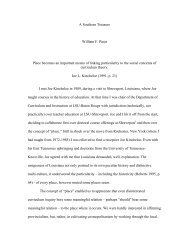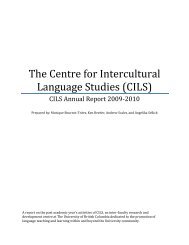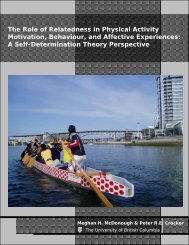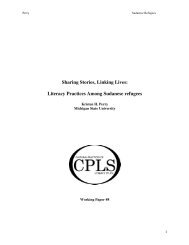The evolution of professionalism - Centre for Policy Studies in ...
The evolution of professionalism - Centre for Policy Studies in ...
The evolution of professionalism - Centre for Policy Studies in ...
Create successful ePaper yourself
Turn your PDF publications into a flip-book with our unique Google optimized e-Paper software.
<strong>The</strong> Context<br />
<strong>The</strong> history <strong>of</strong> teach<strong>in</strong>g <strong>in</strong> Canada has been pr<strong>of</strong>oundly <strong>in</strong>fl uenced by changes<br />
<strong>in</strong> the role <strong>of</strong> the Canadian state. <strong>The</strong> <strong>in</strong>troduction <strong>of</strong> social welfare legislation<br />
based on Keynesian economics, was mirrored <strong>in</strong> social policy as the state took an<br />
active, <strong>in</strong>terventionist role <strong>in</strong> the supply and tra<strong>in</strong><strong>in</strong>g <strong>of</strong> teachers. <strong>The</strong> <strong>in</strong>clusion <strong>of</strong><br />
education and all teacher education <strong>in</strong> the university curriculum has been <strong>in</strong><strong>for</strong>med<br />
by a broader structural societal trend toward pr<strong>of</strong>essionalization and utilitarianism.<br />
<strong>The</strong> liberal concept <strong>of</strong> education has, <strong>in</strong> one sense, been surpassed by the advance <strong>of</strong><br />
a culture <strong>of</strong> pr<strong>of</strong>essionalism <strong>in</strong> Canadian universities and by the pr<strong>of</strong>essionalization<br />
<strong>of</strong> Canadian society.<br />
As <strong>in</strong> other <strong>in</strong>dustrialized societies, the aristocratic ideal <strong>of</strong> civility has been<br />
overtaken by the pr<strong>of</strong>essional ideal, which accord<strong>in</strong>g to Perk<strong>in</strong> is<br />
based on tra<strong>in</strong>ed expertise and selection by merit...[emphasiz<strong>in</strong>g] human capital<br />
rather than passive or active property, highly skilled and differentiated labour<br />
rather than the simple labour theory <strong>of</strong> value, and selection by merit defi ned as<br />
tra<strong>in</strong>ed and certifi ed expertise (Perk<strong>in</strong> 1989, 4).<br />
<strong>The</strong> predom<strong>in</strong>ance <strong>of</strong> this ideal <strong>in</strong> modern society is clearly l<strong>in</strong>ked to the emergence<br />
<strong>of</strong> the <strong>in</strong>terventionist state and its emphasis on the public good. By the late 1960s,<br />
education had become a central legitimat<strong>in</strong>g <strong>in</strong>stitution <strong>in</strong> the modern Canadian state.<br />
As <strong>in</strong> many other countries, education <strong>in</strong> Canada has been shaped by a re<strong>for</strong>mist<br />
trend toward the pr<strong>of</strong>essionalization <strong>of</strong> teach<strong>in</strong>g. This policy trend addresses<br />
the tra<strong>in</strong><strong>in</strong>g <strong>of</strong> school agents, 2 as well as the basic knowledge and competencies<br />
<strong>in</strong>herent <strong>in</strong> their work and their pr<strong>of</strong>essional identity. <strong>The</strong> creation <strong>of</strong> pr<strong>of</strong>essional<br />
colleges <strong>of</strong> teachers <strong>in</strong> British Columbia (1986) and Ontario (1996) are <strong>in</strong> l<strong>in</strong>e with<br />
this movement. Similar <strong>in</strong>itiatives <strong>in</strong> other prov<strong>in</strong>ces (Alberta, New Brunswick,<br />
Nova Scotia) have been aimed at rais<strong>in</strong>g the standards <strong>in</strong> teacher-tra<strong>in</strong><strong>in</strong>g and<br />
better control its quality through the defi nition <strong>of</strong> standards <strong>for</strong> tra<strong>in</strong><strong>in</strong>g and practice<br />
(CMEC 2003). This pr<strong>of</strong>essionalization <strong>of</strong> teach<strong>in</strong>g goes beyond the tra<strong>in</strong><strong>in</strong>g and<br />
education <strong>of</strong> school agents. This is the key issue when it comes to defi n<strong>in</strong>g the place<br />
<strong>of</strong> these agents <strong>in</strong> school and society.<br />
Pr<strong>of</strong>essionalization is regarded as a process <strong>of</strong> negotiation among the different<br />
groups and organizations that share power (economic, organizational, political, and<br />
symbolic) and have access to different <strong>for</strong>ms <strong>of</strong> capital <strong>in</strong> the fi eld <strong>of</strong> education<br />
(Bourdieu, 1969 and 1988). As governments have limited the size <strong>of</strong> the public<br />
space <strong>in</strong> Canadian society, so necessarily the ideals <strong>of</strong> pr<strong>of</strong>essionalism have come<br />
under attack. <strong>The</strong> discourse <strong>of</strong> pr<strong>of</strong>essionalism has <strong>in</strong> some respects been co-opted<br />
by the state and trans<strong>for</strong>med <strong>in</strong>to government by norms. While pr<strong>of</strong>ess<strong>in</strong>g to support<br />
pr<strong>of</strong>essionalization, the substitution <strong>of</strong> credentials <strong>for</strong> pr<strong>of</strong>essional practice serves<br />
to underm<strong>in</strong>e pr<strong>of</strong>essionalism.<br />
<strong>The</strong> ideology <strong>of</strong> pr<strong>of</strong>essionalism places merit and expertise at the centre <strong>of</strong> an<br />
equation connect<strong>in</strong>g <strong>in</strong>dividuals <strong>in</strong>to appropriate vocational slots (Bledste<strong>in</strong> 1976;<br />
Friedson, 1986; Clark 1987; Perk<strong>in</strong> 1989). A central and defi n<strong>in</strong>g characteristic<br />
<strong>of</strong> pr<strong>of</strong>essions <strong>in</strong> modern society has traditionally been their high level <strong>of</strong> relative<br />
autonomy. Pr<strong>of</strong>essionals are expected to make decisions and come to judgements<br />
based on their command <strong>of</strong> a particular body <strong>of</strong> theoretically based knowledge. <strong>The</strong><br />
2 Introduction


